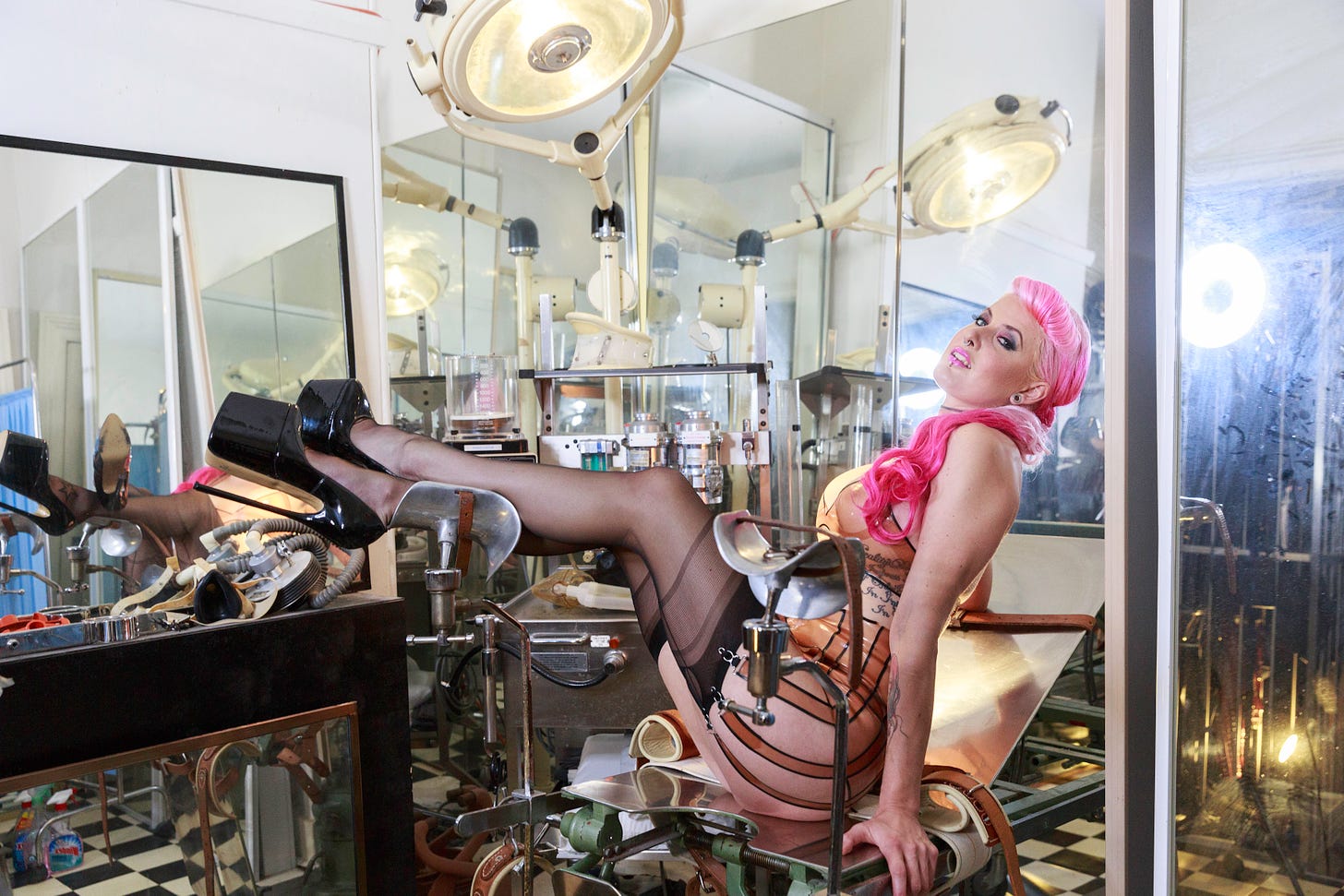What I Learned from Posing for Porn Site SuicideGirls
‘Indie Porn’ author Zahra Stardust on the reality of labor practices she encountered during a SuicideGirls nude photo shoot
An extract from Zahra Stardust’s new book Indie Porn: Revolution, Regulation and Resistance, Duke University Press
It’s 2016. We are in a light-filled Airbnb in Sydney’s inner-city suburb of Redfern on Gadigal Land. It’s midwinter, about 5 degrees, and I have visible goose bumps up and down my legs. I run my fingers through my long pink hair extensions, hold in my stomach, point my toes, and look over my shoulder at Jasmine. I’m excited about finally shooting for SuicideGirls, which has long been a dream of mine. After having my piercings removed from the cover of Penthouse, my armpit hair edited out of Picture magazine, and my labia airbrushed in People magazine, I’m excited to shoot for a site that claims to celebrate alternative beauty. My broken bleached hair couldn’t take much more peroxide, and I take the opportunity to go back to my rainbow roots.
It feels good to be shooting with another SuicideGirl. This is my third out of four shoots in four days. In one shoot, I won’t see the pictures until they go online and have no say over the editing process. In this one, Jas will send me proofs so I can select my favorite forty to sixty among them for a complete set. Working with a fellow model feels collaborative since we both have an interest in the set selling so that we can recoup our costs. I trust her to use flattering angles to get shots that she herself would want as a model.
The poses are familiar to me from glamour modeling. Some are replicas of mainstream magazine poses: on my knees, arching my back, resting my index finger on my bottom lip, pulling my bra strap over my shoulder. But the positions are slightly less brash—there are fewer doggy style and open leg shots and more peripheral shots of body parts: feet, hands, faces. The poses are more subtle, sleepy, modest. I turn my shoulder forward to protrude my collar bone. I bring my hand lightly up to my neck. I look at the camera seductively and then stare off into the distance. It’s what we call in mainstream magazine work “shy nude.”
It is a similar repertoire to what I perform for Feck’s alt-erotica site I Shot Myself, which also prides itself on its alleged distance from mainstream porn. The same way I learned to perform “sex eyes” and bold, dynamic poses from stripping, I learn to perform a doe-eyed, girl-next-door sex-kitten for these purportedly amateur sites. The pose is less-overt porn star but definitely borrows from and utilizes pornographic conventions, even if I am pretending not to be a professional. We run through a standard formula that we know constitutes a sellable set—in fact, we bring up a set from one of the most popular SuicideGirls and adapt each pose.
The model guidelines are prescriptive and titled “How to look good in photos, without (looking like you are) really trying.” They provide instructions on facial expressions (parted lips, smiling eyes, three-quarter profiles, tilted chins, and no duck face), posing (keep it “classy,” avoiding spread shots and positions that exaggerate rolls), hair (washed and lightly styled, no wigs), makeup (thin black eyeliner on the top lid only) and wardrobe (cotton tanks, tall socks, denim shorts, and sundresses). The guidelines include photo examples of what not to do: no stripper heels or stripper attire, including neon fishnets, metallic, sparkles, or “anything crotchless.” Damn.
The specificity reminds me of Australian amateur site Abby Winters, whose ceo had a pet hate for belly rings. Their guidelines instructed models to cover hair regrowth and not to shoot if we had pimples, scratches, or mosquito bites in order that we appear “healthy.” When shooting for Feck, I was told to stop wearing frills, to “tone down the eye makeup” and “maybe don’t talk about politics.” Similar instructions were given to me in a shoot for Hustler magazine: “The model shouldn’t look too tacky, like a stripper, but like a woman with mainstream tastes.” I had become suspicious of “redefined beauty” and “being yourself” as code for a specific class-based aesthetic, positioned against the mainstream but, in reality, equally conventionalized.
I am conscious of my age. My body has changed a lot in the past few years since retiring from pole instructing and as a result of recent ivf treatments. Jas tells me that, at twenty-nine, she is one of the older SuicideGirls in Australia, who are mostly between eighteen and twenty-two. I laugh and say, “I’m thirty-three” and joke that we are both veterans. I am competing with thousands of other “Suicide Hopefuls” all ten to fifteen years my junior and hoping that theirs will be selected as set of the day (sotd). When our set is edited, it goes into a four-month queue, after which it is posted in “Member Review,” where site members can comment and “like” it. Each day the company chooses a sotd, which means the girl moves from being a “Suicide Hopeful” to an official “SuicideGirl” and receives a $500 prize.
Jas tells me that a new set goes live into member review every two hours, so my chance of actually becoming a SuicideGirl and being paid for my set is one in twelve. It’s hard not to be disheartened by these terrible odds. Some models have been hopefuls for years. There are no clear criteria for what the company picks. Jas shows me sets in member review with thousands of likes that have never been chosen and other sets that were selected despite far fewer likes. The process appears to be less about the quality of the set and more like a mixture of popularity, taste, and company discretion. It’s a system that encourages competition between models and, in doing so, extracts more labor from us.
SuicideGirls encourages hopefuls to keep submitting until one of their sets is chosen. This means that the site gains a constant stream of free content for their subscribers. The $500 payment is pitched as a reward rather than renumeration. I have paid $330 for my shoot and location, so after recouping that cost, a sixty-picture, full-nude sotd feature would pay me $170, and this doesn’t include the costs of my wardrobe, transport, or the labor to promote my set. To boost my chances of being picked, I should promote my profile, interact with members, encourage comments, write a blog, and post teasers in special groups interested in feet, arses, or breasts. In the early stages of my career, I might have found this fun. After thirteen years, having done my share of eight-hour shifts in six-inch heels and cold air-conditioning, I’m tired. I have to embark upon the emotional and relational labor of being personable, sexy, and available, of convincing members that I am likable and SuicideGirls that I am marketable.
Regardless of whether you get sotd, Jas tells me, it’s a great way to “build and promote your brand.” With more than 4 million followers on Instagram, Jas tells me the hashtags to use to increase my visibility. Some girls have a hundred thousand followers, Jas tells me, and have been offered paid modeling jobs or have companies sending them free merchandise. It’s something I have heard repeatedly as a live performer and artist—perform for free in return for mass exposure, which rarely (but sometimes) translates into paid work. However, with the dim likelihood of actually being paid for my set, it seems silly not to make the most of this endeavor. Being a SuicideGirl would permit me to tour and diversify my income stream. Reluctantly, I reactivate my Instagram account. As I fill out my bio on the SuicideGirls site I produce a version of myself that seems creative, convincing, and noncontroversial. I select from the drop-down menu “artsy,” “homebody,” and “tree hugger.”
Copyright Duke University Press, 2024
Zahra Stardust is a rainbow-haired, textile-loving writer, scholar and artist. Her book Indie Porn: Revolution, Regulation and Resistance builds on her 15 years as a professional undresser, award-winning stripper, pole dancer and porn star. With an international research portfolio spanning sex worker activism, LGBTQ+ health, sexual rights and sextech, she brings a cultural and media studies approach to sexual health. She passionate about somatic sex education, intimacy coordination and maximalist fashion.






Every photographer knows this one. “Work for free and we'll give you exposure.”
Yeah, right. Exposure don’t put food on the table. I’m not going to waste a day with my expensive camera gear for no reward beyond a few smiles.